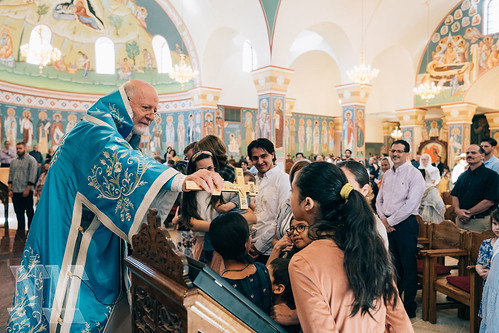Beloved Faithful in Christ,
Greetings and blessings to you in the Name of our Great God and Savior, Jesus Christ!
Seven years ago, I received the staff of archpastoral service from our Father in Christ, Patriarch John X, accepting a grave responsibility for shepherding the souls of this God-protected Archdiocese. By your prayers, I worked diligently to navigate the stormy waters of the global pandemic, and now I must turn our focus to restoring the fullness of liturgical and spiritual life in our parishes.
A Fire Bell in the Night
During my travels throughout the Archdiocese, both before the pandemic and now that I have resumed archpastoral visits, there is one issue that continues to ring out (to borrow an apt phrase from Thomas Jefferson) as a fire bell in the night: our young people leaving the Church. During just about every parish visit, Archdiocese Board meeting, clergy gathering, Parish Life Conference, and Archdiocese Convention, I am asked about our young people: What are we doing for them? How can we keep them in the Church? What new programs can we offer? What curriculum can we create? Since the start of the pandemic, these concerns have been expressed with even greater intensity, as many of our youth and young families are still absent from the life of the Church.
After reflecting upon these difficult questions over the past seven years, I offer a few questions of my own: What if these are the wrong questions? What if our fixation on new programs and curricula is blinding us to a deeper need? What if our anxiety about keeping young people engaged in organizations is misdirected?
Ultimately, it seems to me, there is a fundamental question we may be taking for granted: do our young people know the Crucified and Risen Lord?
The Need for Dialogue
In view of the great responsibility of my office, I must do everything I can to address these questions. As a first step, several months ago, I asked my fellow hierarchs in the Assembly of Bishops to declare this the Year of Youth for Orthodox Christians in our land. I now write this encyclical to share some insights I have gleaned from praying and thinking about how we should respond to this great crisis of our time. I hope to begin a dialogue within our Archdiocese—a dialogue not about our youth but with our youth.
When I am asked about our young people, the questions often come from a place of confusion or misunderstanding—as though we are talking not about the children nurtured in our homes and parishes but about some exotic group of strangers! We do not understand their habits of thought, ways of communicating, and systems of values. On the other hand, when I speak to our youth and young adults, I often hear their own sense of alienation from the “adult” world of their parishes. Over and over again, I hear our young people talk about being set aflame in their faith by an experience of camp or by an inspiring retreat, only to have that flame extinguished by apathetic religiosity in their home. Moreover, they tell me how their desire for inclusion in ministries is often greeted with coldness by older people who cling to those roles and their enthusiasm for new ideas is often met with cynicism by those who insist that things be done as they always have been. How can we engage young people with the Gospel if we do not make the effort to understand them and intentionally embrace them as full members of the Church?
We must all remember that the Church is one Body of Christ which encompasses all of us as members—young and old alike. As St. Paul reminds us, every part of the Body has its function, and no one part can dismiss the role of the others: “The eye cannot say to the hand, ‘I have no need of you’; nor again the head to the feet, ‘I have no need of you'” (1 Corinthians 12:21). Our young people need the guidance and mentorship of their elders, and our older generation needs the enthusiasm and idealism of our young people. In short, we all need each other; and, most importantly, we all need our Lord Jesus Christ, the Head of the Body. We need to draw upon the love and humility of Christ in order to work with one another, heal one another, and rejoice in one another. Our way forward is not in alienation but in communion, not in judgment but in forgiveness, not in lecturing but in listening.
The dialogue I am calling for will not be easy. Our Lord teaches that “the truth will set you free” (John 8:32), yet He also warns that the world loves darkness rather than the Light (John 3:19). Honest conversation will bring to light things we may rather leave unspoken and reveal truths we may wish to deny. Yet, as the Savior said to the Samaritan Woman, “true worshipers will worship the Father in spirit and truth; for the Father is seeking such to worship Him” (John 4:23). True service to God comes from a place of transparent openness, and we cannot serve Him truly until we face all the difficult truths in our lives.
Our Priorities Teach More Than Programs
One truth we must face head-on is that we cannot merely plan ourselves out of this crisis, by hiring a charismatic youth director, by designing the perfect curriculum, or by organizing some program, retreat, or sports tournament. These things are the icing on the cake, but they are not the cake itself.
Our Archdiocese and our parish communities are not mere organizations or institutions but living temples where mankind is inducted into the powerful presence of God, in which we encounter the same Holy Spirit that descended as tongues of fire upon the disciples at Pentecost. Therefore, they must be places where souls find salvation and hearts are set aflame with love for God and neighbor. By God’s grace, they should raise people up “to the measure of the stature of the fullness of Christ,” leading them to be “partakers of the divine nature” (Ephesians 4:13; 2 Peter 1:4). They should inspire those thus brought into contact with the Living God to pour out the living water of the Spirit for the benefit of others, through loving and selfless service. They should embrace the ascetical practices of the Church—fasting, prayers, and almsgiving—which foster repentance and healing in our hearts, by softening them and making them more receptive to God’s transformative grace.
This is the ideal to which we are called, but is all of this actually experienced in our Archdiocese, our parishes, and our homes? In a spirit of repentance, we must ask some difficult questions: How often do our parents prioritize their children’s sports and other activities over bringing them face-to-face with the Living God? How often do our parents pray with their children at home and speak with them about Christ and the saints? In our own lives, do we model fasting and charity or self-indulgence and greed, as an example for our children to follow? Do we encourage moral living as a God-given and life-giving means of sanctification, or do we just demand adherence to cultural prohibitions or, worse yet, ignore morality altogether? At the most basic level, do parents, godparents, aunts, and uncles take responsibility—throughout the week—for passing down the Faith to the children entrusted to them by God, or do they leave this job entirely to the priests, Sunday School teachers, and youth workers, who only see them for a couple hours a week?
Our parishes must also do some soul searching: Does our parish life show our children the importance of sanctity or the importance of paying the bills? Are our parishes focused on passing down “the Faith which was once and for all delivered to the saints” (Jude 3) or on preserving some ethnic identity? Do our people yearn for sermons that challenge them to repentance or just feel-good messages that affirm them in their complacency? Do we prioritize ministries that reach out to the community or social events for our members?
These are difficult questions, but we need to answer them honestly. Their purpose is not to point fingers at anyone but to drive home an important point: our young people learn more from what we do than from what we say. There is an unwritten curriculum we teach them every moment of every day. Regardless of how much we talk about the rich theology of the Church, if we do not live as though we really believe in it, we cannot expect them to do so either.
As Metropolitan of this God-protected Archdiocese, I am committed to devote the resources necessary for youth and young-adult ministries that are second-to-none, but none of that will matter unless we all model what we are teaching. We must all rise to this challenge—hierarchs, clergy, and laity. Although the problem may seem daunting, we do not face it alone. God is with us, and we can do all things through Christ who strengthens us (Philippians 4:13). This, more than any faddish program or strategic plan, will be the source of our success.
To Our Young People
To our young people, I want to say that we love you dearly. From my meetings with many of you, I know how much you struggle to keep the Faith. I know that you are often lonely and anxious. You have many demands on your time and feel burdened by responsibilities. I know that many of you are grieving the loss of loved ones, as a result of this pandemic. I know that many of you missed out on major life moments (such as proms, graduations, sports, and extracurricular activities) and were left for months to learn and socialize via a computer monitor. The time in which I grew up was simpler, and I admire your resilience during these difficult days. Let me also say that my heart breaks when I think about how we, as the elder generation—both clergy and laity—have at times let you down, failed to live up to what we preach, or not supported you enough in your struggles.
I do ask you, nonetheless, to be in dialogue with us, your elders. Yes, we are imperfect, but we are struggling just like you to grow into the people God created us to be. We may be older than you, but we are your fellow pilgrims on the road to God’s Kingdom. This road is both joyous and (if I may be honest) difficult, so let us all cultivate a spirit of mutual forgiveness and support along the way. As part of this dialogue, remember that even though we may not be as adept with the latest technology or as adaptable to change as you are, we do have some timeless wisdom to share with you—the fruit of experience, that most effective teacher. However much the world seems to change, “Jesus Christ is the same yesterday, today, and forever” (Hebrews 13:8), and our path to sanctification as human persons is ever the same.
Each year, on the Sunday of Orthodoxy, we proclaim that this Orthodox Faith has established the universe. It cannot be undermined by the wondrous technologies and bizarre social innovations of our day. Indeed, this Faith has faced challenges in every age—those vanities and temptations that have tried to pull us away from Christ—yet every generation of faithful Christians has overcome those challenges by staying close to Christ, who has shown us that the path of suffering and self-denial leads to eternal life. The Lord told His disciples: “In the world you will have tribulation; but be of good cheer, I have overcome the world” (John 16:33). Joy and peace are not found by capitulating to the pressures around us but by overcoming them hand-in-hand with Christ. Let us all join together in taking up our crosses and following Him.
I have seen news articles proclaiming that your generation will create another “Roaring Twenties” after the pandemic has passed. The authors meant to say that, after pandemic-related restrictions on socializing are lifted, there will be an explosion of immoral behavior. My prayer is that you will yearn not for vain parties but for true communion with Christ and with the family of believers. My dear ones in Christ, let this be a decade where the roaring from your generation is the booming proclamation of the Risen Christ!
Let Us Rise to This Challenge
Beloved faithful in Christ, there is no letter I can write that will adequately sum up all we need to do at this critical time. My purpose here is to begin a process of introspection and openness, of repentance and reconciliation. In our world, young people feel alienated and lonely, scrolling through social media accounts in their bedrooms and wishing for the fulfilling lives they imagine others enjoy; and in nursing homes, the elderly also feel alienated and lonely, surfing through television channels and wondering why their grandchildren do not call or visit. What a tragedy! We need each other, and we must reach out to one another. Certainly, in the Body of Christ, this sense of alienation must not be allowed to persist!
The Lord taught us: “Unless you are converted and become like little children, you will by no means enter the Kingdom of Heaven” (Matthew 18:3). He did not speak this just to the young people but to all of us. Let us all take time to consider what it means to be children of God. I have set this as the theme of next year’s Creative Arts Festivals for this very reason, so that we can be reminded of the need for childlike faith. Let us all, therefore, with youthful innocence and enthusiasm, learn, worship, and serve together as children of God, growing up together “unto the measure of the stature of the fullness of Christ.”
Let us answer this fire bell we hear ringing in the night. I commit to doing my part, but in order to meet this challenge, we need each and every clergyman, parish-council member, parent, teacher, young adult, teen, and child to devote themselves to seeking Christ and living as He has taught us, with real and active love for God and their neighbors. Let us bridge these divides of alienation in our own homes and in our parishes, that we may truly be the Body of Christ, bringing His healing grace to this broken world.
With fervent prayers and great love for you all, I remain,
Your Father in Christ,

+JOSEPH
Archbishop of New York and Metropolitan of all North America

















